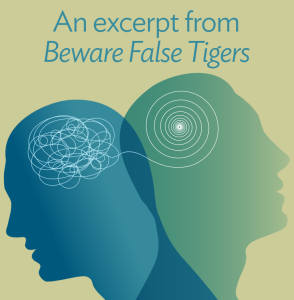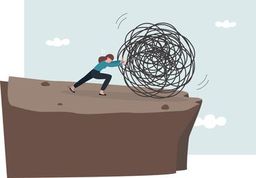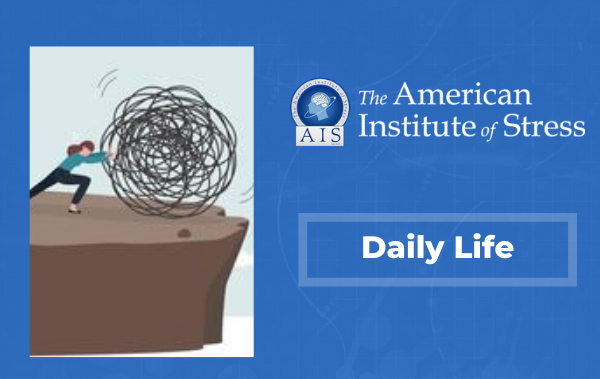*This is an article from the Spring 2022 issue of Contentment Magazine.
Join us for a Free Live Webinar
Beware False Tigers Webinar Series
Session #3 of 4
July 20th at 2:00 PM EST
by Frank Forencich, DAIS
By Frank Forencich, DAIS
Living here in the modern world, you’re no doubt familiar with stress and all the frustrations that go with it. You’re comfortable with the word itself, and you might even suppose that it’s a regular feature of human life. Isn’t it normal for people to feel chronically pressured, anxious, harried, and overloaded? Isn’t this the human condition?
Actually, it’s not.
Historically, humans have always experienced adversity. But as for all animals living in a wild habitat, most of that adversity was occasional and episodic. There were hard times and even life-threatening emergencies, but those challenges usually passed and gave way to a more comfortable, familiar pace of life.
In fact, the word stress didn’t really enter into popular use until the early twentieth century, beginning with the work of Harvard physiologist Walter Cannon and his description of the “fight-flight” response. Years later, the pioneering endocrinologist Hans Selye, sometimes called “the grandfather of stress,” observed that patients with various chronic illnesses appeared to display a common set of symptoms. He also noticed that laboratory animals exposed to cold, drugs, or surgical injury exhibited a typical pattern of responses, a “general adaptation syndrome.” Later in the century, books such as Why Zebras Don’t Get Ulcers by Robert Sapolsky and Full Catastrophe Living by Jon Kabat-Zinn brought stress into popular conversation and awareness.
And today, everyone’s talking about it. Google’s Ngram Viewer, an online tool that tracks the frequency of words that appear in print, shows that the word stress barely made an appearance in the nineteenth century, then rose gradually throughout the twentieth. And now it’s everywhere. Even before the social justice protests and COVID-19 pandemic of 2000, almost everyone was claiming to be “under stress” in one way or another, and even children were claiming that their schoolwork was “stressing us out.”
We all feel it now: this maddening sense of urgency, the impending loss of control, the pervasive cognitive overload, the squeeze of temporal poverty and economic uncertainty. Stress has become a ubiquitous, chronic, and even debilitating feature of the modern world. We often joke about it and sometimes even brag about it, but this is serious, even lethal business on a vast scale. Not only does stress wreck our bodies, it also has extremely negative consequences for cognition and imagination and, in turn, our ability to create a viable future.
Planet of Stress
In 1996, the World Health Organization declared stress a “worldwide epidemic,” and if it was bad then, it’s a thousand times worse now. Global pandemics, widespread economic insecurity, social injustice and racism, political polarization, overwork, lifestyle disease, food and water insecurity, political corruption, misinformation, health care disparities, and looming above it all, the impending collapse of the biosphere. It’s no wonder that the World Health Organization numbers look as bad as they do:
- Close to 1 billion people have a mental disorder.
- Depression is a leading cause of illness and disability;
- A person dies every forty seconds from suicide.
- Every year, 3 million people die due to the harmful use of alcohol.1
In other words, people are suffering on an unprecedented scale. Stress has become a defining experience of our age, and yet, we mostly ignore it, and sometimes even glorify it, declaring it a badge of honor for entrepreneurs and other go-getters who are willing to push the limits.
The problem goes deep, something that psychologist Carl Jung would have recognized immediately. Stress is surging through the collective unconscious of humanity, where it exerts a profound influence on our personal experience and behavior. Our bodies feel the rampant destruction of habitat around the world, the social turmoil, inequality, racism, and injustice. We feel it in the anxiety that courses through our tissue and our lives, but we’re mistaken about its source. Trained by culture to view ourselves as individuals, we blame ourselves for our feelings and our experience. We believe that our stress is our fault alone, a personal failing, a shameful inability to deal with challenge. But in fact, stress is a shared human predicament that extends to all people across the planet. Stress isn’t just your problem or my problem, it’s our problem.
But it’s even worse than all that. Stress even afflicts nonhuman animals. For example, a 2021 study published in the journal Scientific Reports found that animals living in fragmented forests have higher levels of stress hormones than those in larger forest patches. A team of scientists collected fur samples from rodents and marsupials in the Atlantic Forest of Paraguay: “We suspected that organisms in deforested areas would show higher levels of stress than animals in more pristine forests, and we found evidence that that’s true,” reported one of the study’s coauthors.2
Likewise, biologists in the Pacific Northwest have reported increased levels of stress hormones in the orcas (killer whales) of Puget Sound.3 Unable to find adequate food because of extensive dam building and destruction of salmon habitat, these creatures are suffering. In fact, it’s safe to assume similar stress effects in other mammals in disturbed habitats around the world. In other words, stress is more than a human problem; it’s a biological problem that extends beyond our own species to forests, coral reefs, wetlands, and beyond. All of us—humans and nonhuman animals alike—are feeling the effects.
Far from being a mere lifestyle and health annoyance, stress is one of the most pressing problems on our planet. It’s a foundational issue that compromises our cognition and our ability to deal with reality: stress contracts our imagination, our intelligence, and, most of all, our sapience. Stress encourages short-term thinking and impairs our judgment at the very time when we need it most. When we’re under the influence of cortisol, we lapse into dysfunctional behavior and fail to meet our responsibilities. We ignore evidence, act rashly, focus on trivial matters, and fight one another, all of which compromise our ability to deal with a complex and demanding world.
In short, excessive stress makes everything worse, both individually and collectively. Not only does it ruin or personal health, it also degrades the abilities we so desperately need at this moment in history. To put it another way, we might well rank the stress hormone cortisol as one of the most problematic substances on the planet—along with plastic, endocrine disruptors, excess antibiotics, and carbon. In other words, stress isn’t just a health problem—it’s an ecological problem, a social problem, a national security problem, a problem of national culture and character, and a problem for the totality of life on Earth. And we ignore it at our peril.
The Standard Narrative
Of course, most of us have heard about stress, and we think we know what it’s all about. We’ve heard the conventional narrative in popular books, magazines, websites, and in casual conversations with friends and coworkers. That is, stress is an individual problem with individual solutions. It’s an isolated, personal experience that has nothing to do with history, society, culture, or context. If you’re feeling overwhelmed, harried, or exhausted, it’s up to you to make an adjustment. And of course, we’ve all heard the typical prescriptions for stress relief: get plenty of exercise, talk to your friends, write in your journal, practice mindfulness, listen to soothing music, and, of course, take some deep breaths.
The standard narrative does give us some useful ideas to play with, but sadly, it doesn’t go far enough. What we see at the supermarket checkout stand is a simplistic story that fails to reflect the complexity, meaning, and potential of stress. Most importantly, the narrative fails because it puts stress in the wrong category. Most of us have been conditioned to believe that stress belongs in the health-medicine-lifestyle pigeonhole, closely related to themes of fitness, wellness, and well-being. It’s a personal issue. If you’re feeling stressed, there’s something wrong with you, your body, your life, or your attitude.
If this perspective sounds familiar, that’s because this individualistic orientation is baked into modern culture at large. In the world of medicine, disease is something that takes place inside our skins; the body is examined and treated as an isolated, stand-alone organism—a medical object. In the world of psychology, mental health is often treated as something that takes place inside the skulls of isolated human beings: depression, anxiety, and mood disorders are individual problems with individual solutions. Even the word health is generally taken to mean personal health, in spite of the fact that modern science now shows that many of our physical ailments are highly contagious and shared across populations. For a hyper-social species such as ourselves, health is always interconnected, and in fact, the very idea of a healthy individual is something of a misnomer. There can be no health in isolation.
To be sure, some physicians and health providers do advise their patients to “get more sleep,” “try some meditation,” or “manage your stress.” And for the affluent and the “worried well,” there are plenty of exotic options, including spas, retreats, and workshops. Some corporate programs attempt to address the issue in-house, but most rely on the standard narrative and the belief that, ultimately, it’s up to the individual to adapt.
In short, the standard stress narrative fails to account for the fact that hyper-social human animals are radically connected to one another and that we share in the creation of our experience and the world. To be sure, individuals do experience stress, but it’s also true that stress is contagious across families, workplaces, society, and culture. The new sciences of interpersonal neurobiology and social neuroscience vividly demonstrate that thinking, feeling, emotion, and stress are widely shared, distributed across tribes and, now, populations.
Wrong Objective
The standard narrative also gets it wrong by suggesting that stress is nothing more than a problem to be solved. It’s an abnormal deviation from our regular lives, something to be eliminated. In other words, if you’re feeling distress, anxiety, depression, or fragmented attention, there’s something wrong with your life that needs to be fixed, adjusted, medicated, or resolved. You, my friend, are broken. But if you follow the recommendations of the standard narrative, you might be able to get back to equanimity.
But all of this ignores history and context. Today, we live in a historically abnormal world, one that’s marked by extraordinarily high levels of ecological stress, social stress, and economic stress, all of which are chronic. Of course, we feel anxious and depressed. This is the normal reaction of animals that are forced to live in an abnormal, alien environment. In other words, we’re behaving and responding in a way that’s consistent with our ancestry and our circumstances.
But the standard narrative tells us that stress is something that we need to somehow “get over.” If we practice the right techniques and use the right products, we can get back to our normal, peaceful lives. On the face of it, this might sound right, but on deeper reflection, we begin to realize that there are actually some stresses that we really don’t want to “get over.”
Suppose that the people in your life or your community are suffering from illness or injustice. Do you really want to get over this stress and move on to a state of peace and equanimity?
Suppose that the precious natural habitat of your region is bulldozed for yet another shopping mall or chemical plant, while biodiversity is crashing around the world. Do you really want to get over this?
Suppose that giant corporations are using their power to suck the life out of your community and hoard their wealth, leaving your people stranded. Do you really want to get over this fact and just let it go?
In fact, maybe this desire to “get over” our stress is really part of our problem. Maybe what we really need is to feel our stress more acutely and fight back with highly focused action. Maybe some kinds of stress actually shouldn’t go away; maybe we should even be more stressed about the conditions we’re living in.
Wrong Tigers
The problem with the standard narrative is that it deals mostly with the small tigers in our lives—the typical culprits of modern living. Stress is cast as an annoying but mostly benign inconvenience. It’s unpleasant, but thankfully, there’s a set of easy “tips” to help us feel better. But this approach ignores the blunt-force reality that stress can crush our spirits and obliterate our ability to function in the world. The focus on easy lifestyle tips obscures the fact that stress goes all the way to the heart of the human experience. It also obscures the fact that if we really want to feel better, we might need to make substantive, even wholesale revisions to our relationship to life and the world at large, none of which is easy in the slightest.
As it stands, the standard narrative has little or nothing to tell us about the truly epic forms of stress that shatter our lives and cause us so much suffering. It tells us little about the life-crushing traumas of death, divorce, grinding poverty, and social injustice and, above all, the precarious state of the biosphere and the looming threat of ecological collapse.
There are a host of challenges facing humanity at this moment, but without question, one of the most pressing is our inability to distinguish between outright lies, illusory dangers (false tigers), and catastrophic threats to the future (real tigers). For the massively stressed modern human, living under the constant influence of hyperactive, shock-value media, all threats are presented as equal in their urgency and consequence. We act as if there’s no substantive difference between the demise of the last Blockbuster video outlet and the extinction of animals, birds, and insects. We make poor assessments of authentic dangers and overrespond to trivial, even illusory threats. We are stress illiterates, dangers to ourselves and others.
To put it another way, the standard narrative has virtually nothing to say about the really big tigers of our day. It’ll tell you how to keep stress from compromising your youthful appearance, but it won’t tell you how to stop fossil fuel destruction of the atmosphere. It’ll tell you how to live a long life, but it won’t tell you how to preserve a functional biosphere. It’ll tell you how to feel less harried at work, but it won’t tell you how to make your life meaningful in the face of radical social inequality.
Wrong Orientation
Ultimately, the standard narrative fails because it frames stress as an external problem. Stress is something that comes from outside our bodies, as an alien visitor from beyond. We complain about being “under” stress, as if it’s an external force bearing down on our heads and shoulders. This externalized orientation is captured in the popular phrase stress management. That is, stress is something “out there,” and if we could just contain it or manipulate it in the right way, all would be well.
This view reminds us of similar modernisms such as time management, risk management, crisis management, human resource management, and ecosystem management, all of which imply an external world that needs to be controlled. But these dualistic approaches amount to an otherizing of the cosmos, the externalization of the world—yet another expression of alienated consciousness. The locus of our difficulties and our stress lies outside of us. When in doubt, manage something.
To be sure, it’s obviously the case that external, objective tigers can and do “attack” us from time to time. And yes, there are external agents, forces, and processes that sometimes need to be controlled and managed. But as you’ll see, most of our stressful experiences are matters of perception, interpretation, meaning, and, above all, relationship. In other words, our stress may well be “out there,” but it’s also “in here.”
A New Narrative
The time has come to give stress the respect that it deserves, but sadly, we just don’t have much of a curriculum for dealing with stress on any scale, either individually or culturally. The standard narrative is typically offered as a supplemental program, an add-on or enrichment to our regular curriculums. We wait until people are massively overloaded, teetering on burnout and lifestyle disease, then step in with stress-management workshops to help people regain their equanimity. But this is often a downstream act of desperation, an emergency measure that’s too little, too late.
Given our lack of substantive stress education, it’s no wonder that so many of us get things so wildly wrong. Our behaviors are often out of sync and out of proportion. We respond to stressors with the wrong intensity, at the wrong time, and for the wrong duration. We overreact to minor insults and underreact to genuinely threatening challenges. To put it in physiological terms, we’re autonomic slop artists—we freak out about false tigers while we ignore the real ones.
Our problem is compounded by the fact that our brains—primed by evolution for survival in natural, outdoor habitats—are not particularly good at distinguishing real tigers from false ones in a hypercomplex modern world. Uneducated in the arts of threat assessment and proportional response, we overreact to trivial matters, personal dramas, and petty politics. At the same time, we radically underreact to the really big tigers that threaten to bring down our planetary life-support systems: ecological overshoot, the climate crisis, destruction of habitat and biodiversity, social injustice, and other systemic failures that literally threaten our ability to have a functional future.
In short, our failure to recognize the difference between real and false tigers is having radical, cascading consequences, not just for us as individuals but for all of us, humans and nonhumans alike. All of which calls for a new approach. We need a curriculum that’s more expansive, richer, and more nuanced. We need something that speaks not just to the plight of the harried individual, but also to the systemic, interconnected nature of our predicament, especially the big historical, social, and ecological tigers of our age. This new narrative will serve as a remedy, not by promising to banish stress from our lives but by giving it meaning and making it relevant to the challenges of our day. The goal is not to make our stress disappear, but to listen and learn what it’s teaching us.
References
- World Health Organization Fact Sheets: https://www.who.int/news-room/fact-sheets
- Science Daily February 4, 2021”Deforestation is stressing mammals out” https://www.sciencedaily.com/releases/2021/02/210204101640.htm
- Seattle Times “Lack of salmon stressing whales more than boat noise, study says” https://www.seattletimes.com/seattle-news/lack-of-salmon-stressing-whales-more-than-boat-noise-study-says/
ABOUT THE AUTHOR
 Frank Forencich earned his BA at Stanford University in human biology and neuroscience and has over thirty years of teaching experience in martial art and health education. He’s the author of several books about health and the human predicament including The Sapience Curriculum and Beware False Tigers.
Frank Forencich earned his BA at Stanford University in human biology and neuroscience and has over thirty years of teaching experience in martial art and health education. He’s the author of several books about health and the human predicament including The Sapience Curriculum and Beware False Tigers.
Contentment Magazine
The dictionary defines “content” as being in a state of peaceful happiness. The AIS magazine is called Contentment because we want all of our guests and members to find contentment in their lives by learning about stress management and finding what works best for each them. Stress is unavoidable, and comes in many shapes and sizes that makes being in a state of peaceful happiness seem like a very lofty goal. But happiness is easy to find once you are able to find ways to manage your stress and keep a healthy perspective when going though difficult times in life. You will always have stress, but stress does not always have you!


